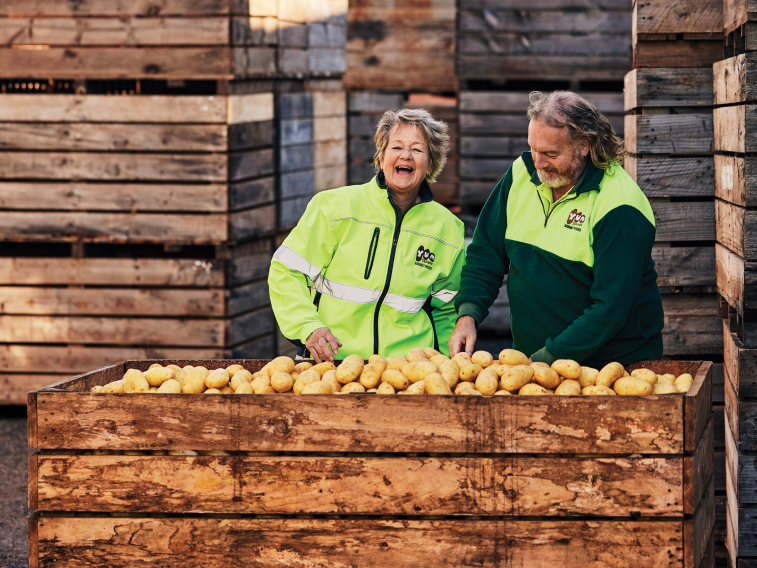The latest NAB Regional & Agribusiness webinar provides insights on the Australian & Global Economies, and a regional and rural property update. Watch the webinar here.


Learning on the job has never looked so good. How Yum Tasmanian built a potato-growing empire from a neglected cattle pasture.

Terrence and Wendy Rattray never planned to go into potatoes. Their company, Yum Tasmanian, started as a side project.
Now, almost 30 years on, Yum produces 7,000 tonnes of potatoes a year, supplying major supermarkets around Australia.
“In 1995 we accidentally started growing a few spuds and it just snowballed from there,” Terrence explains.
Serendipity led the Rattrays to the land – Terrence was recuperating from a workplace injury earned as a carpenter when they bought 160 acres of neglected cattle pasture with a plan to run a small herd. But with good business sense, and a nose for opportunity, they realised the property would be ideal for organic potato farming.
At the time, the Tasmanian potato growing industry was a mixture of practices.
“If I had a dollar for every bit of bad advice I got, I wouldn’t need to grow potatoes anymore,” Terrence says. “But that’s all right. We learnt from experience, pretty much, and kept drawing knowledge from every place we could.”
As they learned on the job, the Rattrays quickly expanded. Potatoes are still the main game for Yum, and while certified organic spuds make up only a small portion of their business – together with a secondary business line in onions – they continue to apply organic farming principles and knowledge.
Yum rotates break crops like wheat, brassicas and pyrethrum daisies (processed into natural insecticides). While those crops bring in appreciable revenue, they also improve soil health and productivity.
“The main benefits are in conditioning and cleaning up the soil,” Terence says, “giving time for any potato and onion diseases to dwindle.”
The diversity in crops and methods reflects the Rattrays’ approach of trying new things, finding new solutions and taking the best elements before making them their own.
And that’s led to Yum’s near-constant expansion over the past three decades. The company is continually adding new packing sheds, new lines of business or new farmland.
To finance this growth, the Rattrays needed a banking partner that could understand the business.
“NAB was talked about to me as the only bank to be with if you wanted a business bank,” Terrence says. “So we went to NAB and haven’t looked back.”
Beginning with term debt, Yum now does all its banking with NAB. One of the most important elements for expansion has been the revolving asset finance facility, combined with a trade facility.
Yum has used that capacity to import equipment and supplies, like centre pivots for irrigation and fungicides, directly from manufacturers.
Having access to those banking facilities means that Yum has also been able to turn these purchases into their own revenue streams, by on-selling to other local farmers.
“We have a great relationship with NAB,” Terrence says. “They know our business inside and out, which makes helping us, when we need help, easy.”
© National Australia Bank Limited. ABN 12 004 044 937 AFSL and Australian Credit Licence 230686.